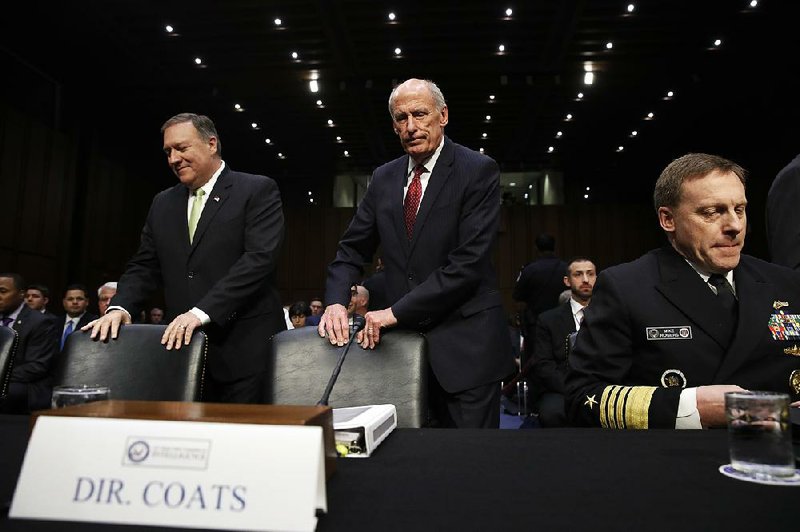WASHINGTON -- North Korea's nuclear-weapons program poses a potentially "existential" threat to the United States, the national intelligence director said Thursday in an appraisal to Congress.
Dan Coats said the unprecedented nuclear and missile testing last year indicates that North Korean leader Kim Jong Un is intent on proving North Korea's capability.
And North Korea's statements that it needs nuclear weapons to survive suggest that Kim "does not intend to negotiate them away at any price," Coats said at a Senate intelligence hearing on worldwide threats.
The heads of six U.S. intelligence agencies reviewed a slew of national security challenges facing the United States, warning about deteriorating security in Afghanistan, China's rising challenge, and Russian and other countries' use of cyberspace to target the U.S. and its allies.
Senators sought an assessment of when North Korea would be able to strike the U.S. with a nuclear weapon. Coats declined to provide such details in an open hearing. Sen. Dianne Feinstein, D-Calif., countered, "It's time for the American people to understand."
Coats, however, described the threat as potentially "existential."
North Korea's missile tests in 2016, including a space launch that put a satellite into orbit, have shortened its pathway toward a reliable intercontinental missile that could strike the U.S., he said, and the North has expanded the size and sophistication of its ballistic missile forces.
Lt. Gen. Vincent Stewart, the Defense Intelligence Agency's director, said North Korea is at the same time developing a nuclear device and processing fissile material, aiming to miniaturize a device for a warhead to mount on such missiles.
"They are on that path, and they are committed to doing that," he said.
On Iran, whose nuclear ambitions preoccupied Washington under President Barack Obama, Coats said the U.S. sees the Islamic Republic maintaining last year's agreement that contains its program in exchange for sanctions relief.
The deal has enhanced transparency of Iran's nuclear activities, Coats said, and he cited Obama administration estimates that the time it would take Iran to produce enough material for a nuclear weapon has been extended from a few months to about a year.
But he said the U.S. doesn't know if Iran will eventually decide to try to build nuclear weapons.
Intelligence chiefs gave a somber appraisal of security in Afghanistan, scene of America's longest-running war. U.S. forces invaded after 9/11 to defeat al-Qaida and their Taliban hosts, and President Donald Trump's administration is reviewing strategy and considering an augmentation of the current 8,500-strong U.S. force.
Coats said the situation will deteriorate, and the Taliban will make gains, especially in rural areas. The performance of Afghan national security forces will worsen because of weak military leadership, desertions and combat casualties, he predicted.
If left unchecked, Stewart added, the "stalemate" will deteriorate in the Taliban's favor, risking "all the gains" from U.S.-backed efforts there.
The Trump administration is considering sending 3,000 to 5,000 additional troops to Afghanistan to help train Afghan security forces. Coats said Afghan troops suffer from "combat casualties, desertions, poor logistical support and weak leadership."
"Kabul's political dysfunction and ineffectiveness will almost certainly be the greatest vulnerability to stability in 2017," he wrote in a 26-page statement summarizing the yearly joint report to Congress by the nation's intelligence agencies delivered ahead of his committee appearance.
Coats said Russia, China, North Korea and Iran are using cyberspace to target U.S. and its allies, and will do so in the future.
He described Russia as a "major threat" to U.S. government, military, diplomatic, business and critical infrastructure and said the country will keep up its attacks after seeking to influence the 2016 presidential vote.
"In 2017, Russia is likely to be more assertive in global affairs, more unpredictable in its approach to the United States, and more authoritarian in its approach to domestic politics," Coats said in the statement.
China is also targeting the U.S. government and American businesses, Coats said, though he said such activity has diminished since a 2015 U.S.-Chinese agreement addressing cybertheft.
Coats' statement also addressed concerns over China's continued construction on islands and other geographic features in the South China Sea, according to the statement, and will have its first long-range, sea-based nuclear capability when it finishes developing its JL-2 submarine-launched ballistic missile.
Coats appeared before the Senate committee along with other intelligence agency leaders, including CIA Director Mike Pompeo and National Security Agency Director Mike Rogers. But much of the attention turned to acting FBI Director Andrew McCabe, making his first public appearance in that role since Trump fired James Comey on Tuesday.
Information for this article was contributed by Matthew Pennington and Deb Riechmann of The Associated Press; and by Nick Wadhams and Tony Capaccio of Bloomberg News.
A Section on 05/12/2017

